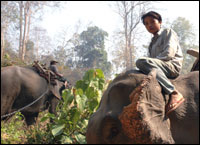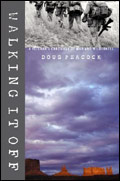
Walking It Off
by Doug Peacock,
Ewu Press, 208 pgs.,
2005.
Think you know Doug Peacock? Think again.
He was the inspiration for George Washington Hayduke, the hard-charging, Vietnam-scarred protagonist of Edward Abbey’s classic environmental novel The Monkey Wrench Gang. But there’s more to the Peacock story than just trashing bulldozers and causing trouble — a truth his new memoir, Walking It Off, makes abundantly clear.
Becoming a spiritual leader for the environmental movement, he says, has been tough to live down. “You know, it’s a terrible thing to read your own press,” he says, “but it’s even worse to live a life of somebody else’s fiction.”
Like his alter ego, Peacock, now 63, is a Vietnam vet, a committed environmentalist, and even something of a misfit loner. The Michigan native, fresh from the war, met Abbey in the late 1960s through a mutual friend. The two formed a fast bond, prowling the desert Southwest and Alaska together for the better part of 20 years. When Abbey died in 1989, Peacock was there, wrapping his mentor’s body in a sleeping bag and laying him to rest among the scrub brush of the Arizona desert.
That’s where Walking It Off, Peacock’s long-awaited memoir, picks up the story, recounting several solo backcountry trips the author took in the early ’90s. The book centers around a particularly fateful experience in Nepal — where he nearly bled to death at high altitude — and unfolds as he tries to make sense of his own mortality: revisiting old stomping grounds and stopping off at old Ed’s grave in the Cabeza Prieta wilderness.
Walking It Off comes across as part adventure journal and part psychology lesson, as the author struggles to explain the opposing forces — Vietnam and the American wilderness — that have shaped his life. It’s refreshing to see the human side of Abbey and his semi-mythic subject. Peacock, who’s spent decades as an outdoor journalist and wildlife researcher, certainly knows what he’s doing as a writer. After all, his Grizzly Years is a veritable classic of the genre.
But as the title suggests, Walking It Off tends to wander a bit. Peacock has traveled all over the world and tells some compelling stories, but the different threads tend to run together. One minute he’s sleeping in a pickup, the next he’s staggering around the Himalayas looking death square in the face. Though it all fits together in the end, keeping up with the narrative takes some flipping back and forth.
Peacock is currently working on a new project in the Yukon, but he recently took some time to speak with Grist by phone — discussing his life, his friend Ed Abbey, and his ongoing love affair with the world’s wild places.
This book draws a lot of parallels between Vietnam and the American West — what’s the connection there?
I was basically never able to separate the landscapes of Vietnam from the wilderness of the Rocky Mountains, and I think that’s guided my obsessions and my passions more than anything. I see fighting for wildness much like warfare.
Is that why you went out into the wild after Vietnam?
That was a little bit different. When I came back from Vietnam, I was like a lot of other veterans: I was really out of sorts, I couldn’t talk to anybody, I didn’t know what the hell was going on. So I went to the one place where I was comfortable in my life, and that happened to be the woods.
Describe your relationship with Ed Abbey.
Well, it was the most difficult close friendship of my entire life. And, you know, I was a real prick during those days: I’d hit the ground at any loud noise or sudden movement, and I’d fight at the drop of a hat. Ed, bless his heart, was and is an eternally cantankerous son of a bitch.
How do you think Abbey would respond to the current state of the environmental movement?
He would roll over in his grave. I think it’s fair to say that there’s never been an administration that’s waged war against life more effectively than the Bush administration — human life, animal life, and wilderness. Everybody has become entrenched — worried about their corporate sponsors and their relationships with the government — and you don’t see many bold voices ready to take on everybody. Ed Abbey did that his entire life.
Is that why his work has endured?
He was a man who wrote about the freedom of dignity, and those were not goddamn empty words to Ed. He deeply cared about the kind of world he was leaving behind for his children.
What are your feelings on Earth First! and other radical environmentalists?
You know, I was never really centrally a part of that. I was too much of a loner. First of all, [Earth First!] was plucked right out of the pages of The Monkey Wrench Gang, and it was a surprisingly, wonderfully effective organization in that it brought a dialogue. All of a sudden, mainstream Sierra Club environmentalists seemed quite reasonable compared with what Earth First! was proposing. Those days were actually a little indulgent, but quite wonderful, too.
How would you define yourself now?
My life is dedicated to saving what’s left of the wilderness, the wild country. But I have few social skills; I don’t belong to groups and I don’t join organizations. So I mainly stand on the sidelines cheering. I know a lot of folk and I serve as a sort of spiritual adviser to some very effective conservation groups.
What about the grizzlies? What drew you to them?
[The grizzly] is the one animal in North America that absolutely rivets your attention. You walk through Colorado, California, and pretty much any other place and you’re top dog, but in grizzly country that is not the case. There’s a fundamental humility you feel in grizzly country that informs us of our organic place in the world: close, but not at the top of the food chain.
Does that mean the years have tempered your view of death?
I had to make a friend of death in Nepal, because I didn’t think I was going to get out of there. Fortunately, I had the great example of Ed Abbey. I mean, I walked with him into death a long ways, but he died such a dignified, wonderful, utterly alive death. Ed said, “The fear of death follows the fear of life” — that a man who lives fully is prepared to die at any time. I take a lot of strength from that.



